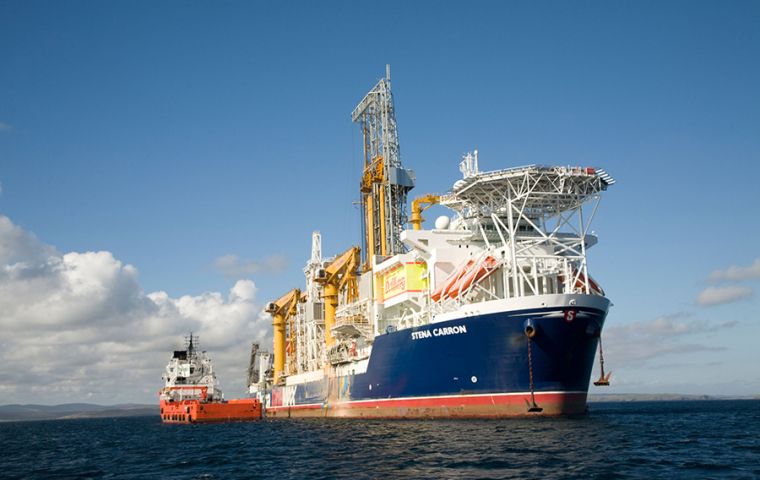MercoPress. South Atlantic News Agency
Exxon resumes drilling in Guyana; local politics battle over the future oil revenue
 “Travel restrictions have impacted our ability to move workers into Guyana and will impact our ability to maintain normal operations offshore,” Exxon said
“Travel restrictions have impacted our ability to move workers into Guyana and will impact our ability to maintain normal operations offshore,” Exxon said Exxon Mobil resumed drilling in Guyana last month, underscoring its dedication to the offshore hotspot despite the oil price crash and a messy turn in local politics.
Two of Exxon’s four drill ships went back to work, according to data published Friday by Baker Hughes Co. The company later confirmed that the Stena Carron and Noble Tom Madden vessels returned to full operations last month. The rigs had been shut when the country of less than a million closed its borders after the pandemic hit South America.
Guyana is one of the major exploration successes for a company that has come under criticism for how it manages capital. Its oil and natural gas unit took a hit of as much as US$ 3.1 billion in the second quarter due to the pandemic-induced price collapse, it said July 2.
“Travel restrictions have impacted our ability to move workers into Guyana and will impact our ability to maintain normal operations offshore,” Exxon said in an emailed statement late Friday.
The oil major “will also adjust the pace of our development projects and exploration activities” given the plunge in oil prices, but still plans to pursue “key exploration opportunities,” it said.
While Exxon is overcoming operational difficulties in Guyana, a political standoff is delaying approval of a US$ 6 billion expansion. The 220,000 barrel-a-day Payara project was slated to start production in 2023, and Exxon and its partner Hess Corp. have already said it could be delayed by up to a year.
Guyana President David Granger is challenging a March 2 election that handed the opposition a narrow victory, even after a recount and international pressure to step aside. A prolonged legal battle is in store after he dismissed on Wednesday a Caribbean Court of Justice decision that favors the opposition.
“Having to sit on their hands because of political developments is a problem,” said Schreiner Parker, the vice president for Latin America at Rystad Energy, a consultancy. “This is a headache and it is causing delays, and will push sanctioning to the right.”
Apart from drilling interruption, repairs to Exxon’s first production vessel in Guyana constrained output in the second quarter and forced it to flare natural gas, postponing plans to reach the unit’s peak production of 120,000 barrels a day. Repairs were delayed because specialist technicians were held up by Covid-19 travel restrictions, Exxon said.
Prolonged political uncertainty has drawn even more attention to a region where failed-state Venezuela is a growing geopolitical disaster, and neighboring Trinidad and Tobago is suffering from the downturn in oil and natural gas prices. In Guyana, Granger lost a vote of no confidence in 2018 but managed to delay an election until this year.
“The dispute in Guyana is clearly over who controls the oil money,” said Jed Baily, a director at consultancy Energy Narrative. “It’s classic resource curse type material”




Top Comments
Disclaimer & comment rulesCommenting for this story is now closed.
If you have a Facebook account, become a fan and comment on our Facebook Page!